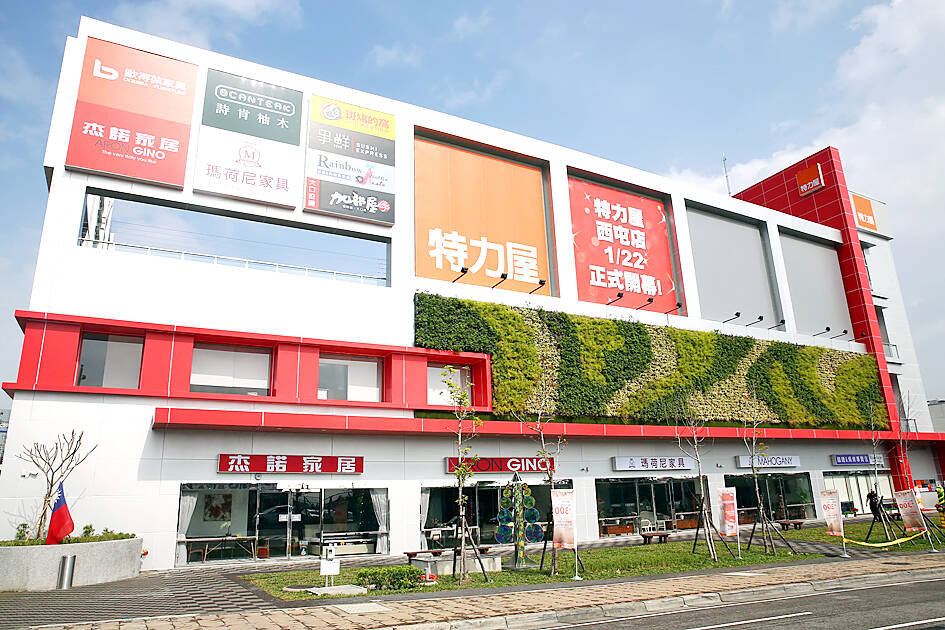Test Rite International Co (特力), a Taiwanese company engaged primarily in trading and retail businesses, yesterday announced a capital increase for its subsidiary Test Rite Retail Co (特力屋), plus an initial public offering within three years.
The home improvement retail unit would issue 26 million common shares at NT$38 per share, raising a total of NT$988 million to strengthen its working capital, the parent company said.
A majority of 85 percent of the new shares will be subscribed by the company’s existing shareholders, while the remaining 15 percent will be reserved for its employees, it said.

Photo: Chang Jing-ya, Taipei Times
The capital increase would boost the retail unit’s paid-in capital from NT$700 million to NT$960 million, with the parent company’s stake declining from 100 percent to 72.92 percent, it said.
The retail unit currently operates 63 stores across Taiwan including 28 large stores and 35 community outlets. It is seeking to expand its retail footprint by adding 6 new stores this year, bringing the total to 69 locations, the company said.
In addition, the unit is actively expanding its service-oriented business highlighting the offer of free professional consultation and in-home services.
This program has seen positive results in pilot locations in Taipei and New Taipei City, the company said, adding that it would expand the program to six more stores this year.
In the future, the unit plans to accelerate its e-commerce development, focusing on home renovation solutions, while strengthening its online-merge-offline model to drive overall revenue growth, it said.
Test Rite International reported consolidated revenue of NT$36.77 billion for last year, an increase of 3.65 percent from the previous year, with NT$19.77 billion from the trading business and NT$17 billion from the retail business. It serves retailers at home and abroad, including Wal-Mart Inc, Sam's Club, Target Corp, Office Depot Inc and Carrefour SA.

KEEPING UP: The acquisition of a cleanroom in Taiwan would enable Micron to increase production in a market where demand continues to outpace supply, a Micron official said Micron Technology Inc has signed a letter of intent to buy a fabrication site in Taiwan from Powerchip Semiconductor Manufacturing Corp (力積電) for US$1.8 billion to expand its production of memory chips. Micron would take control of the P5 site in Miaoli County’s Tongluo Township (銅鑼) and plans to ramp up DRAM production in phases after the transaction closes in the second quarter, the company said in a statement on Saturday. The acquisition includes an existing 12 inch fab cleanroom of 27,871m2 and would further position Micron to address growing global demand for memory solutions, the company said. Micron expects the transaction to

Vincent Wei led fellow Singaporean farmers around an empty Malaysian plot, laying out plans for a greenhouse and rows of leafy vegetables. What he pitched was not just space for crops, but a lifeline for growers struggling to make ends meet in a city-state with high prices and little vacant land. The future agriculture hub is part of a joint special economic zone launched last year by the two neighbors, expected to cost US$123 million and produce 10,000 tonnes of fresh produce annually. It is attracting Singaporean farmers with promises of cheaper land, labor and energy just over the border.

US actor Matthew McConaughey has filed recordings of his image and voice with US patent authorities to protect them from unauthorized usage by artificial intelligence (AI) platforms, a representative said earlier this week. Several video clips and audio recordings were registered by the commercial arm of the Just Keep Livin’ Foundation, a non-profit created by the Oscar-winning actor and his wife, Camila, according to the US Patent and Trademark Office database. Many artists are increasingly concerned about the uncontrolled use of their image via generative AI since the rollout of ChatGPT and other AI-powered tools. Several US states have adopted

A proposed billionaires’ tax in California has ignited a political uproar in Silicon Valley, with tech titans threatening to leave the state while California Governor Gavin Newsom of the Democratic Party maneuvers to defeat a levy that he fears would lead to an exodus of wealth. A technology mecca, California has more billionaires than any other US state — a few hundred, by some estimates. About half its personal income tax revenue, a financial backbone in the nearly US$350 billion budget, comes from the top 1 percent of earners. A large healthcare union is attempting to place a proposal before